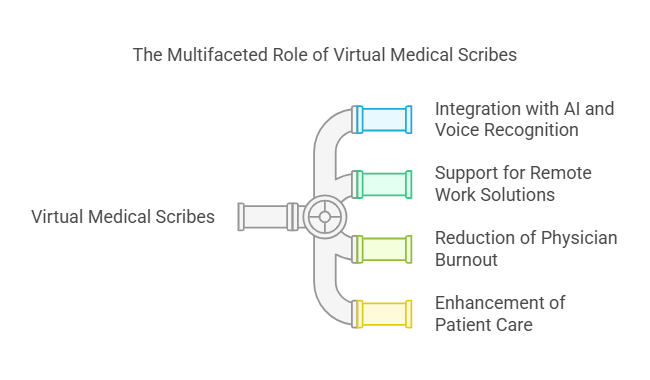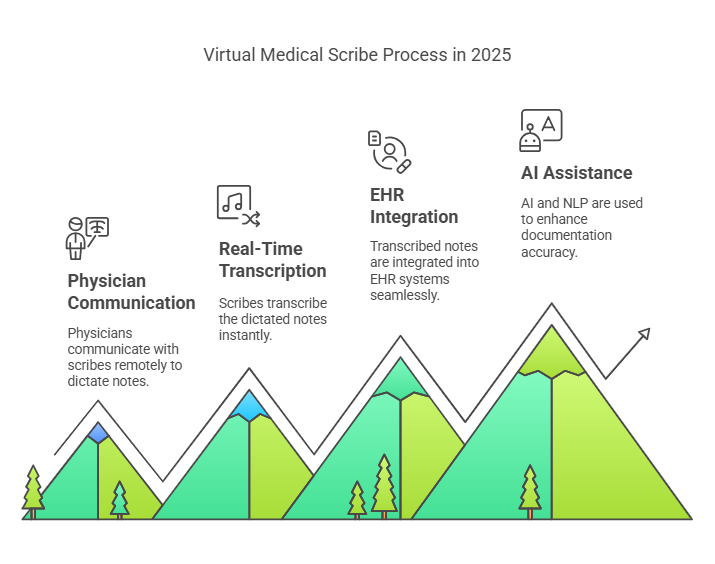Why Virtual Medical Scribes Are Revolutionizing EHR Management | Acmso
Virtual medical scribes have emerged as a revolutionary solution for streamlining electronic health record (EHR) management. With the rapid advancements in healthcare technology, the need for efficient, accurate, and secure documentation has never been more critical. Traditional methods of manual data entry often lead to inefficiencies, physician burnout, and documentation errors. However, in 2025, virtual medical scribes certifications are playing a transformative role in improving healthcare documentation, enhancing patient care, and reducing administrative burdens.
The Growing Need for Virtual Medical Scribes in 2025
The healthcare industry is still growing with the help of artificial intelligence (AI), voice recognition, and remote work solutions. These developments are integrated easily with virtual medical scribes to ensure that healthcare providers can still be efficient and compliant without jeopardizing patient care.
The National Institutes of Health (NIH) states that physician burnout has greatly increased due to administrative overload. Virtual medical scribes assist in easing this burden by documenting in real-time, thus enabling the doctors to concentrate on their patients and not on the EHRs.
Key Benefits of Virtual Medical Scribes
1. Enhanced Efficiency and Productivity
Virtual medical scribes reduce the time physicians spend on data entry, allowing them to allocate more time to patient interactions. This results in:
Faster patient processing times: By handling documentation tasks, virtual scribes enable physicians to see more patients or spend more quality time with each patient, improving workflow efficiency and productivity.
Improved workflow efficiency: Virtual scribes streamline administrative tasks, allowing healthcare providers to focus on patient care rather than paperwork.
Greater focus on patient care: This shift in focus enhances patient outcomes and improves doctor-patient relationships.
2. Improved Accuracy and Compliance
The accuracy of medical records is crucial for quality patient care and legal compliance. Virtual scribes ensure:
Real-time, error-free documentation
Compliance with HIPAA and EHR regulations
Reduction in medical errors and misinterpretations
3. Cost-Effective Healthcare Solutions
As healthcare operations become more expensive, many facilities are moving toward the use of virtual medical scribes because of the cost-effectiveness of virtual scribes as opposed to in-person scribes. Virtual scribe services:
Lower overhead costs
Do not require extra office space
Offer a lasting benefit of avoiding documentation and audit mistakes at no extra cost.
4. Reduction in Physician Burnout
A 2025 study by the Centers for Disease Control and Prevention (CDC) has found that physician burnout is still on the rise in the U.S. healthcare system. Virtual medical scribes assist in reducing stress and fatigue through documentation tasks so doctors can concentrate on patient care.
How Virtual Medical Scribes Work in 2025
The integration of AI-powered virtual medical scribes with EHR systems has become more advanced in 2025. Here's how the process works:
Real-Time Documentation: Physicians communicate with scribes remotely, dictating notes, orders, and diagnoses, which are transcribed instantly.
Seamless EHR Integration: Virtual scribes integrate directly with major EHR platforms, ensuring smooth workflows.
AI-Powered Assistance: Many virtual scribes now leverage AI and natural language processing (NLP) to enhance documentation accuracy.
The Impact of Virtual Scribes on Telemedicine
With the continuous rise of telemedicine, virtual medical scribes are becoming indispensable. They assist in:
Capturing virtual patient interactions in real-time
Reducing documentation errors in telehealth consultations
Ensuring a smooth physician-patient experience in remote healthcare settings
Security and Compliance: Protecting Patient Data
Ensuring the security of patient data is paramount, especially with the increased reliance on virtual solutions. Virtual scribe providers strictly adhere to:
HIPAA Regulations to protect patient privacy
Data Encryption Standards to prevent unauthorized access
Regular Compliance Audits to ensure secure documentation practices
1. Technology and Connectivity Issues
Challenge:
Virtual medical scribes depend on reliable technology and a stable internet connection to access electronic health records and document patient interactions in real-time. However, connectivity problems or software glitches can interrupt their work, leading to delays or incomplete documentation.
Solution:
Implementing AI-driven voice recognition software with offline capabilities addresses these issues. This advanced software can:
Record Accurately: Convert spoken words into text efficiently, reducing the risk of human error.
Operate Offline: Continue to document patient encounters even when internet connectivity is weak or temporarily lost. Once the connection is restored, the data can be synchronized automatically.
Enhance Productivity: Allow scribes to work seamlessly, ensuring that patient records remain complete and accurate regardless of technical setbacks.
2. Data Privacy Concerns
Challenge:
Handling sensitive patient information always carries the risk of data breaches or unauthorized access. In a virtual environment, where data travels across networks, ensuring the security and privacy of patient records is even more critical.
Solution:
Enforcing robust security measures such as end-to-end encryption ensures that the data remains secure from the point of capture to storage. Additionally, strict adherence to HIPAA and other federal healthcare regulations means that:
Data is Protected: Every stage of the data transmission and storage process is secured against potential cyber threats.
Compliance is Maintained: Virtual scribes operate under protocols that meet or exceed legal and regulatory standards, thereby safeguarding patient confidentiality and building trust in the healthcare system.
3. Specialty-Specific Adaptation
Challenge:
Medical documentation can vary greatly across different specialties. For instance, the terminology, abbreviations, and clinical details in cardiology differ significantly from those in neurology or oncology. A one-size-fits-all approach may result in inaccuracies or incomplete records.
Solution:
Customized training programs are essential for virtual scribes to adapt to the unique requirements of various medical specialties. This targeted training helps in:
Improving Accuracy: Scribes learn the specific language and documentation standards of each specialty, ensuring precise capture of clinical details.
Enhancing Efficiency: With specialized knowledge, scribes can work faster and more effectively, reducing the time clinicians spend on correcting or clarifying documentation.
Tailoring Documentation: Customized training ensures that the documentation not only meets clinical needs but also supports optimal patient care across different medical disciplines.
The Future of Virtual Medical Scribes
With the growing development of AI and automation, it is anticipated that virtual medical scribes will become more intelligent and efficient in the future. Some of the future trends include:
Integration with AI enabled voice assistants for more speedy and precise documentation
Real time automated analytics to enhance patient care.
Blockchain technology for improving the reliability of medical records.
Final Thoughts: The Growing Role of Virtual Medical Scribes
The healthcare industry is experiencing a digital revolution, and virtual medical scribes, as endorsed by ACMSO, are at the forefront of this transformation. By improving efficiency, accuracy, cost-effectiveness, and security, virtual scribes have become essential tools for modern medical practices. Healthcare providers looking to optimize their EHR workflows, reduce physician burnout, and enhance patient care should consider integrating virtual medical scribe services into their operations.
Lesser-Known Facts About Virtual Medical Scribes
Voice Biometrics Integration:
Some systems now use voice biometrics to verify that the recorded dictations are coming from authorized providers, enhancing security beyond standard password protocols.Link: https://www.pindrop.com/article/voice-biometric-authentication-patient-privacy/
Sentiment Analysis for Physician Well-being:
AI-driven sentiment analysis tools can monitor the tone and pace of dictations, offering early warnings when a physician’s stress levels may be rising.Real-Time Clinical Analytics:
A few platforms provide instant data analytics that identify documentation gaps or potential areas for patient follow-up, adding an extra layer of clinical support.Link: https://neolytix.com/benefits-of-virtual-medical-scribe-services/
Multilingual Capabilities:
In regions with diverse populations, virtual scribes are being trained to handle multiple languages, ensuring that non-English patient interactions are documented accurately.Predictive Coding Assistance:
By leveraging historical data and machine learning, some virtual scribes can suggest appropriate billing codes, reducing errors in claim submissions.Link: https://scribemedics.org/misconceptions-virtual-medical-scribe/
Specialty-Specific Customization:
Customized algorithms allow scribes to adapt their templates and language models to niche specialties, such as pediatric care or oncology, which have very distinct documentation needs.Link: https://www.deepscribe.ai/resources/virtual-medical-scribes-the-good-the-bad-and-the-ugly
Remote Collaboration Tools:
Integrated collaboration features let physicians, scribes, and even consulting specialists work on the same record in real time, boosting both accuracy and teamwork.Link: https://staffingly.com/what-tools-do-virtual-scribes-use-for-real-time-documentation/
Blockchain for Record Integrity:
Certain platforms are experimenting with blockchain to secure EHR entries, making it virtually impossible to alter records post-documentation without leaving a trace.Dynamic Learning Systems:
Continuous feedback loops from clinicians help train and refine the AI components, ensuring that the system evolves with new medical terminologies and practice patterns.Link: https://www.getfreed.ai/resources/virtual-medical-scribe
Regulatory Trend Monitoring:
Advanced scribe systems now include modules that monitor regulatory changes globally, automatically adjusting documentation practices to meet emerging standards.
FAQs
-
Virtual medical scribes are professionals who utilize advanced digital tools and AI-driven software to document patient encounters. They help improve efficiency, accuracy, cost-effectiveness, and security in healthcare documentation, enabling modern practices to streamline electronic health record (EHR) workflows and reduce physician burnout.
-
One major challenge is maintaining reliable connectivity and handling technology glitches. Unstable internet connections can disrupt real-time documentation. The solution involves implementing AI-driven voice recognition software with offline capabilities, ensuring continuous and accurate documentation even when connectivity is compromised.
-
Protecting sensitive patient information is crucial. Virtual scribes tackle data privacy issues by enforcing end-to-end encryption and adhering strictly to HIPAA and federal healthcare regulations. These measures ensure that patient data is securely transmitted and stored throughout the documentation process.
-
Different medical specialties have unique terminologies, abbreviations, and documentation requirements. Customized training programs help virtual scribes understand these nuances, ensuring that the documentation is accurate and tailored to each specialty, which in turn supports better patient care.
-
By taking over the time-consuming task of documentation, virtual scribes free up physicians to focus on direct patient care. This not only improves the quality of care but also reduces the administrative burden that contributes to physician burnout.
-
Virtual scribes contribute to cost-effectiveness by reducing the need for full-time, in-house administrative staff. Their ability to streamline EHR workflows and reduce errors leads to significant savings in time and resources, making healthcare operations more efficient.
-
AI-driven voice recognition technology improves the accuracy of converting spoken language into text. Its offline capabilities ensure that documentation can continue seamlessly even when there are connectivity issues, thereby enhancing overall productivity and reliability in the documentation process.
-
ACMSO, referenced as a key keyword, underscores the industry's move toward embracing digital solutions in healthcare. It signifies the endorsement and support for integrating virtual medical scribes into modern medical practices, which aligns with the broader digital transformation aimed at optimizing efficiency, reducing errors, and enhancing patient care.








